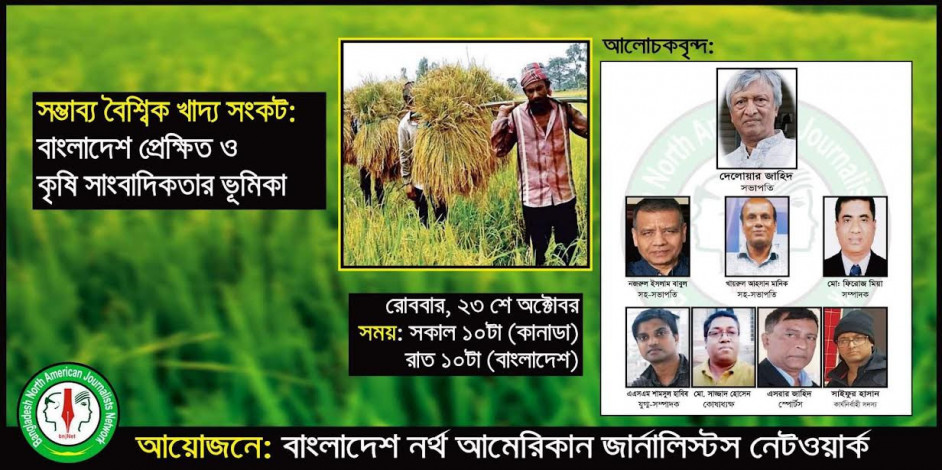
Photo: Collected
There is no alternative to Bangabandhu's dream of building
an egalitarian economy and cooperative village to face a possible global food
crisis. For this, development of agricultural journalism is necessary.
Speakers said this in a virtual discussion titled
"Potential Global Food Crisis: Bangladesh Perspective and Role of
Agricultural Journalism" organized by Bangladesh North American
Journalists Network on Sunday (October, 23, 2022) night.
The speakers said that Father of the Nation Bangabandhu
Sheikh Mujibur Rahman dreamed of building an egalitarian cooperative village in
Bangladesh some time before his death. He also started efforts to organize the
people of the village and take collective initiatives to solve their problems
themselves. Agricultural journalism in Bangladesh needs to be emphasized to
balance the agricultural problems of the third world, including Bangladesh, as
well as the problems of the past, present and near future. In view of the
possible global food crisis, the aim of Bangladesh will be to help bring the
country down from the medium level of hunger to the low level of hunger and to
achieve this goal, develop agricultural journalism in the country.
They said, historically, the main activity and vitality of the economy of Bangladesh is agriculture. From the post-independence state of Bangladesh, agriculture has become paramount in dealing with every crisis. The need for productivity, income growth and employment generation in rural areas in the country is constantly being realized. Where 50 percent of the current manpower of the country is engaged in agriculture, various vested interests have demanded agriculture in all fields.
Population growth, loss of agricultural land, facing
problems like salinity, drought, floods, crop damage due to floods, hailstorms,
fog, cold flows and other natural disasters, lack of good quality seeds,
fertilizers, and irrigation, will be discussed in the virtual discussion on
building sustainable agriculture. The executives of the network were Vice
President Nazrul Islam Babul from the United States and Khairul Ahsan Manik
from Bangladesh, General Secretary Md Feroz Mia, Joint Secretary ASM Shamsul Habib,
Treasurer Md Sajjad Hosan, Zahid Khosru of Esr and Saifur Hasan from Canada.
Canadian expatriate researcher, writer and journalist Delwar Zahid presided
over it.
Speakers said that in the coming crisis of the country,
support to increase production and trade, development of transparency,
innovation and joint planning should be ensured and strategies should be taken
to increase investment in transformation of food system. Russia-Ukraine war,
global instability, reduction in food production, disruption in transportation
system, etc., there are fears that the global food crisis will become more
severe in the future.
They said, like the Covid-19 situation, Prime Minister
Sheikh Hasina has to act in the light of the advance message she has given to
prepare the countrymen for a possible global food crisis. Regular awareness
advertisements in mass media and agricultural pages should be kept in newspapers
and social media should be used to the maximum about cropland protection,
agricultural information.
President Delwar Zahid said, according to the GHI-2022
jointly published by Ireland-based organization "Concern Worldwide"
and Germany's "Welt Hunger Help", Bangladesh's position in the global
hunger index has decreased somewhat. However, the hope is that out of 121
countries in the world, Pakistan, India and Afghanistan are ranked 99th, 107th
and 109th respectively. Compared to that, Bangladesh is in a better position.
Bangladesh's position is now 84th.
Source:
Online/SZK
Comment Now